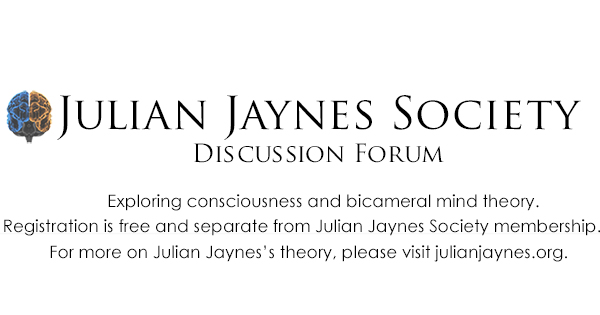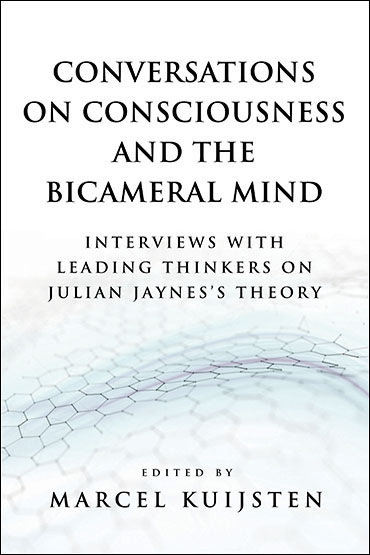Did anyone else notice a strong Jaynesian flavour to Philip Pullman's His Dark Materials Trilogy.
The strongest parallel was the Daemons. For those who haven;t read the books, these are animal companions to every person, and they act very much as a bicameral voice would, and create a kind of analog I split within each individual.
There are other parallels too, but I'll leave those to anyone who wants to teaste them out on this topic.
Your thoughts welcome.
The Bicameral Mind in His Dark Materials /The Golden Compass
-
sambrenton
- Posts: 4
- Joined: Wed Apr 13, 2005 10:24 am
I haven't read Pullman's books but it sounds similar to the description of Socrates' daemon as described in "Voices of Reason, Voices of Insanity" by Leudar & Thomas. Socrates had a voice he called a "daemon" that advised him and guided his actions.
Leudar & Thomas are critical of Jaynes's interpretation of a lack of subjective consciousness in the Illiad, but at the same time much of their review on verbal hallucinations is highly supportive of Jaynes's bicameral mind theory. However, the book is geared toward clinicians.
It would be interesting to know if Pullman was influenced at all by Jaynes's work.
Leudar & Thomas are critical of Jaynes's interpretation of a lack of subjective consciousness in the Illiad, but at the same time much of their review on verbal hallucinations is highly supportive of Jaynes's bicameral mind theory. However, the book is geared toward clinicians.
It would be interesting to know if Pullman was influenced at all by Jaynes's work.
The Golden Compass
I never had a chance to read Pullman's books but last night I went and saw the movie adaptation of The Golden Compass.
Like the initial post mentions with regard to the books, in the movie most of the characters have a "daemon." A person's daemon is a form of companion, which in the story are manifested as living animals but can be viewed in Jaynesian terms as a bicameral or hallucinated voice, much like children's imaginary playmates or the daemon of Socrates.
Also at stake in the story is modern consciousness or "freewill" itself...
Has anyone else had a chance to read the books or see the The Golden Compass and noticed the Jaynesian aspects?
Like the initial post mentions with regard to the books, in the movie most of the characters have a "daemon." A person's daemon is a form of companion, which in the story are manifested as living animals but can be viewed in Jaynesian terms as a bicameral or hallucinated voice, much like children's imaginary playmates or the daemon of Socrates.
Also at stake in the story is modern consciousness or "freewill" itself...
Has anyone else had a chance to read the books or see the The Golden Compass and noticed the Jaynesian aspects?
The Golden Compass
Pullman's philosophy is ultimately Gnostic in its approach. As such he applies the Gnostic concept of the Daemon and the Eidolon (although the latter is never mentioned as such). For the Gnostics all human beings consist of two independent but closely related areas of conscious awareness. The Eidolon is the ever-day personality that identifies itself as 'I' or 'Me' and the Daemon is the ongoing, immortal part that guides and warns. For the ancient Romans this was termed 'The Genius'. Indeed such a theme can be forned in most esoteric religious traditions (particularly those that can be defined as 'gnostic' such as the Sufis and the Kabbalists). The 'Daemon' is the inner spark that is part of the 'universe behind the universe'. This was termed 'The Plerama' by the Gnostic sages.
Pullman also applies quantum physics theory to his universe - specifically Hugh Everett's Many-Worlds Interpretation - and in doing so applies an interesting twist to the relationship between consciousness and quantum indeterminacy.
In my opinion this fits in fully with Julian Jaynes theory of bicameralism.
For an ongoing discussion with regard to the implications of this please feel free to check out my website and (particularly) my blogsite where recent contributions have referenced The Golden Compass.
Pullman also applies quantum physics theory to his universe - specifically Hugh Everett's Many-Worlds Interpretation - and in doing so applies an interesting twist to the relationship between consciousness and quantum indeterminacy.
In my opinion this fits in fully with Julian Jaynes theory of bicameralism.
For an ongoing discussion with regard to the implications of this please feel free to check out my website and (particularly) my blogsite where recent contributions have referenced The Golden Compass.
The Golden Compass
Since Pullman's daemons are almost always of different gender from their possessors, I think they are probably based on the Jungian anima/animus concept. They are consistent with Jaynes' work, though, inasmuch as Jaynes' bicameral mind can be thought of as the neural substrate to Jung's archetype.
-
HurdyGurdyMan
- Posts: 6
- Joined: Sun Feb 25, 2007 7:03 pm
Re: The Bicameral Mind in His Dark Materials /The Golden Compass
A most interesting, and informative series of posts. I saw the movie, and I was also reminded of the animal mind as substrate for the conscious mind of the characters. It is an animal upon which consciousness is posited. As there cannot be a disembodied spirit, we are always attached to our animal selves. There is no consciousness without a physical correlation. One has to wonder if maybe the characters with the monkey daemons weren't, perhaps, more in touch with the components of their more recent evolutionary past. I think I would choose a Homo Sapien daemon. It might proove exponentially more effective for those tight spots. But, above all else, I would hope that I would know just who it really is that is talking to me. That would be yet all the more powerful.
HGM
HGM
The only voo-doo is what you do.
-
logictweek
- Posts: 12
- Joined: Fri May 06, 2011 11:00 pm
Re: The Bicameral Mind in His Dark Materials /The Golden Com
The story has a British Isles/Northern Europe setting; the most obvious source are the "familiars" from the folklore/mythology/witchcraft of that area:
http://oaks.nvg.org/nord.html#fams
https://en.wikipedia.org/wiki/Familiar
In fact, there are many witch characters in the story.
Pullman plays around with many very big concepts in these books: daemons, Jungian themes, dark matter, string theory, as mentioned. There is also the theme of good vs. evil, strongly influenced by Milton's Paradise Lost. And a coming-of-age theme, with the children having a special psychic energy which adults don't, which attracts psychic parasites or vampires, IIRC.
My criticism of the series is that he's actually toying with too many big themes and the story gets too cluttered by the end. Any one of the above themes could have made for an interesting story on its own, but putting them all in there together is kind of pushing it.
http://oaks.nvg.org/nord.html#fams
https://en.wikipedia.org/wiki/Familiar
In fact, there are many witch characters in the story.
Pullman plays around with many very big concepts in these books: daemons, Jungian themes, dark matter, string theory, as mentioned. There is also the theme of good vs. evil, strongly influenced by Milton's Paradise Lost. And a coming-of-age theme, with the children having a special psychic energy which adults don't, which attracts psychic parasites or vampires, IIRC.
My criticism of the series is that he's actually toying with too many big themes and the story gets too cluttered by the end. Any one of the above themes could have made for an interesting story on its own, but putting them all in there together is kind of pushing it.
Re: The Bicameral Mind in His Dark Materials /The Golden Compass
I watched season 1 of His Dark Materials and was disappointed. Firstly, the acting and script were very weak, even for a series aimed at teenagers. Secondly, I found the connection to Jaynes's theory extremely tenuous. Yes, people had daemons, but there was no particular segregation in function between person and daemon with respect to cognition. The daemons just contributed as an occasional backup narrator. If we take bicameralism seriously then the daemons should be ordering people around and making all the important decisions. Verdict: Waste of time.


